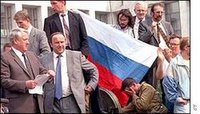Russian Drama of August 19
 Early in the morning 15 years ago - it was Tuesday August 19, 1991 - a TV announcement in the Soviet Union said that emergency rule had been declared, that Michael Gorbachov was sick and that power was now in the hands of an emergency committee namned GKChP.
Early in the morning 15 years ago - it was Tuesday August 19, 1991 - a TV announcement in the Soviet Union said that emergency rule had been declared, that Michael Gorbachov was sick and that power was now in the hands of an emergency committee namned GKChP.The day after had been supposed to be the signing of the new union treaty. But for the conspirators - the KGB, parts of the army, the interior ministry, conservative communists - it was seen as the death of the Soviet Union.
That's why they decided to strike.
The evening before they had detained Gorbachev at his vacation place on the Crimea. Now tanks were rolling into Moscow from all directions to enforce the clamp-down that had been decided and announced.
In some way, it was supposed to be the repetition of what we had seen in Hungary in 1956, Czechoslovakia in 1968 and Poland in 1981.
Now, the tanks were needed to save Soviet power in the Soviet Union itself.
More or less the same group of conspirators had tried to clamp-down violently on the Baltic countries earlier in the year. At that time, they must have had at least the passive support of Gorbachev himself.
But in spite of extensive preparations in all three countries they had failed. Tanks against people didn't work in the age of television, but 13 people had been killed in the battle for the TV tower in Vilnius in Lithuania.
Now they were determined to take power in the country as a whole to prevent the Soviet Union from disintegrating.
But they made one absolutely critical mistake: they forgot to immediately arrest the President of the Russian Federation Boris Yeltsin.
Very soon after the dramatic announcement, Yeltsin´s car had raced into Moscow past the columns of tanks, and within hours he climbed up on a tank outside the so called White House and read out his defiant statement. He was accompanied by a Russian rather than a Soviet flag.
It was an act that changed history.
With massive popular support for Yeltsin, even the KGB's elite Alpha Group of soldiers hesitated to attack the White House through the crowds. And soon the key paratroopers and some other army units began having their doubts as well.
Within two days it was clear that the coup had failed - and that Boris Yeltsin was the new leader of a new Russia. Soon he were to take the bold move of recognizing the independence of Estonia, Latvia and Lithuania. Soon he would outlaw the Communist Party and dissolve the Soviet Union as a whole.
We can only speculate on what would have happen if the conspirators had arrested Yeltsin in the early morning hours of that August 19th. It would have been easy.
Without a forceful opposition, they would have taken control of all of Moscow. And there would have been tanks rolling into also Vilnius, Riga and Tallinn - as well as other cities - very soon. There would have been violence and deaths throughout the area. We can not know how the army units still remaining in Central Europe would have reacted. It would have been profoundly dangereous.
But Boris Yeltsin saved us and Russia.
What Vladimir Putin thought - and which side he was really on - during those dramatic days I do not know.
But there are certainly no celebrations in the Kremlin on this important day in the history of Russia and Europe.


<< Home